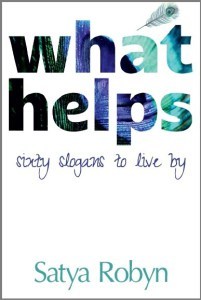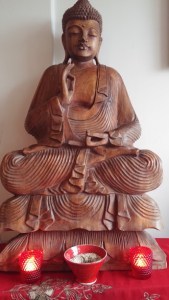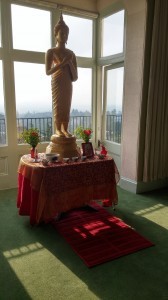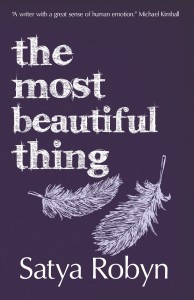Satya Robyn's Blog, page 5
January 31, 2018
Salena Godden says: This Helps
 1. Pessimism is for lightweights
1. Pessimism is for lightweights
2. courage is a muscle
3. It isn’t punk to ask for permission
4. Never, ever give up!
5, Make light!
6. Go where the love is
These slogans help me switch off social media and get on with writing. They help me to be more generous. To stop comparing my path with others who seem to have an easier journey. To understand that people often hide their true struggle. To focus on one page at a time, one step at a time, one day at a time and not to worry about the whole end result. That the journey is the destination. That to be kind and more generous feels better in the long run and to always give a bit just more when you think your tank is empty.
Oh one last thing, switching of the computer and going walking, walking in the park, or walking in the woods, or through city streets, walking helps everything. going for a long walk and looking up at the sky seems to put everything into perspective.
*
Salena Godden is a British poet, performer and author living in London.
January 25, 2018
What helps when your head explodes
 This morning I worked on how I was going to launch my new book ‘What Helps‘ into the world.
This morning I worked on how I was going to launch my new book ‘What Helps‘ into the world.
I’ve had a busy week, and today in my diary I’d written ‘take it easy’. As I started brainstorming about my book, I decided I’d like to run an online course called ‘This Helps’, and started to create an online forum. I thought I could do some interviews with people I admired and started writing the invitation. I decided to start a series of blogs (this one is the first). Oh, and I had those two other jobs on my to do list, and I needed to finish that thing…
My head fizzed and threatened to explode. I thought, ‘now is the time to take your own advice, Satya’ and I looked at the first slogan in the book.
Begin here.
I began here. I noticed the spinning in my head, and the blood pumping through my body. I acknowledged the feelings swishing through me – a mixture of excitement, anxiety, and panic. I discovered I was cold. I looked outside at the sunny garden, and watched a blackbird hopping across the empty vegetable patch.
Wheeeeeeeew. Right. First, the urgent job. Then, a cup of tea. Then, write a list of all the ideas I’ve had so far and decide what first and what for another today. My head settled down, and my morning proceeded in an orderly manner.
When we take time to tune in – what’s happening in our minds and bodies? what’s happening around us? – we are given our next step. We just need to remember to begin here.
If you begin here, what do you discover? What answers are you given?
*
This is the first in a series of blogs to celebrate my new book What Helps: Sixty Slogans to Live By, each featuring one of the slogans in the book. This is the first, which you can read in full here. Watch out for the interviews, coming soon!
Sparkler by David Zawila via Unsplash, with gratitude
January 23, 2018
When things go wrong, what helps?
 “We’ve been filled with great treasure for one purpose – to be spilled.” ~ Yoko Ono
“We’ve been filled with great treasure for one purpose – to be spilled.” ~ Yoko Ono
When we are unsatisfied with our lives or when things go wrong, where can we find the best wisdom?
It’s a funny old thing, wisdom. There are infinite amounts available out there. When seeking it you can choose from reading thousands of books from throughout the ages, asking your friends, listening to Dharma talks, studying at Universities, attending groups…
And yet… We are often more resistant than we think to new wisdom, which threatens the status quo. Sometimes wisdom is like the drip drip drip of water which, over decades, wears a deep hole into rock. Sometimes it is like a big old pile of snow on the roof above us which suddenly envelops us with a SWOOSH!!! Sometimes it is like sweet rain that never penetrates our umbrella and rainproof clothing (which we think are keeping us safe), not even a teensy weensy bit.
I have been filled with great treasures over the years. The rain falls on me in my ongoing psychotherapy training, my own therapy sessions, and my sessions with my own clients. It has flooded me through my experience in 12 step groups. I have bathed in it during my adventures as a spiritual seeker and as a Buddhist Priest. Lots of it has run straight off me, but I’ve managed to soak plenty up.
I’ve poured whatever I can into my new book, ‘What Helps: Sixty Slogans to Live By’. The book is my attempt at distilling everything wonderful I’ve ever been given into a few dozen short phrases. It also contains clutches of questions you can ask yourself, stories about my own patchwork experience, and generous helpings of inspiration, consolation and hope.
The book will be out soon, and I can’t wait to pass what I’ve got on. In the meantime, what wisdom do you think you might have been resisting? If you stopped deciding that certain people/books/places didn’t have anything to offer you, what might you receive from them? What treasures do you have to pass on, and how do you already do that? (to your children, your work colleagues etc.) How else might you pass it on?
January 20, 2018
On struggling to be good to myself
 I am poorly. My throat is raw, my nose is running and my right eye-lid is twitching.
I am poorly. My throat is raw, my nose is running and my right eye-lid is twitching.
Today is a work day for us, and so this morning I’ve been dutifully sitting at my desk, dealing with a bit of email, printing out some new leaflets for the temple…
None of this work is urgent. I have been persevering because a part of me that I know as ‘Striver’ is strongly conditioned to Always Forge Forwards, regardless of how I’m feeling or how much work I have. This part is afraid that, if I stop, my Slob will take over and pin me to the sofa for weeks, or people will stop being impressed by my productivity and criticise me, or simply that the entire world will fall into chaos.
My Striver has taken refuge in the identity of a productive person, and the illusion of the control this gives me over my environment and other people. I can understand that. But I can also gently remind it that these refuges are unreliable, impermanent, as all worldly refuges are. I can tell it that, instead, I can rely on something bigger – something that keeps the Universe from falling apart when I spend the afternoon reading detective stories on a work day.
In the Dhammapada, the Buddha tells us:
Easy to do are things
that are bad and harmful to oneself.
But exceedingly difficult to do
are things that are good and beneficial.
Sometimes ‘things that are bad and harmful to oneself’ are obviously so – binge eating, drinking, getting furious at people. Sometimes they are more socially acceptable – over-working, over-exercising, pouring our energy into becoming a ‘success’, wasting the world’s resources by over-consuming material goods… Either way, we do these things because we are taking an easy refuge in them, to keep us from feeling our feelings or from having to face something unsavoury about ourselves or the world.
We can take refuge in something else. It is often the more difficult choice, but in the long run these choices make us happier and healthier. This afternoon I will notice the anxiety as I put my work aside, and reassure the parts of me that are panicky. I will try to feed myself vegetables and not just sugar. I will keep my eye on the big wooden Buddha who represents something I can lean into, painful throat, anxiety and all, and to feel safe and cared for just as I am.
What has been ‘easy for you to do’ that is harming you? What is the alternative? How might refuge help you?
*The Dhammapada: The Buddha’s Path of Wisdom, translated from Pāli by Acharya Buddharakkhita (listen to the original Pali being chanted here).
January 11, 2018
Something I forget every other minute
 a single pink petal lounges in the sea of the grey-blue washing up bowl
a single pink petal lounges in the sea of the grey-blue washing up bowl
I just became a single pink petal for a few moments. As I wrote this short piece, I remembered spotting the petal in the washing up bowl and searched for a word. Was the petal floating in the water? That’s a boring word. Was it being supported by the water? I feel my shoulders wiggling deliciously as I enact the petal’s movements, and suddenly I know. It was lounging!
This is what happens when we try to translate our experience into words. We zoom in, and we pay attention to the details we usually miss. We linger a little, as we swill the smell of oranges or incense around in our noses. We feel our way into being that singing bird, that stressed mother, that fresh expanse of sky.
I call these fragments of writing small stones, and I’ve been writing them on and off for decades. When I make a daily commitment to write one, it helps me to zoom in, linger and feel my way into being in the world, rather than just going through the motions. I need to be reminded of this as often as I can – I forget to do it every other minute. It’s a bit like how it is to be living in a Buddhist temple, regardless of how many Buddhas we have around the place, I am still regularly struck when I see them – oh! Just take refuge! Relax!
Writing small stones connects me to my favourite blue bench which is currently splashed in sunlight, and it also connects me to the small bundle of nerves in my throat. It helps me appreciate my golden cup of tea, and points me towards the divine. It isn’t about being a ‘good writer’, although I do think language is delicious. It’s about being a good zoom-linger-connector. We could all do with some practice at that.
I’m offering one of our Writing Our Way Home courses from Tuesday 16th, Writing Ourselves Alive, and I’m also planning on writing along and posting my small stones in the private Facebook group. I’ll be in Kyoto for some of it, exciting! If you’d like to join me, with or without registering for the course, it’d be lovely to have you along. Just buy yourself a notebook and begin!
January 9, 2018
What are your ingredients for a good life?
Before I wrote this blog, I invited myself to sit down with a cup of chicory in my grey bucket chair.
I watched the blackbird skip and hop along the low wall, and let my eyes rest on the morning mist veiling the valley. I enjoyed the fierce gold sparkles in Quan Yin’s halo on my wall hanging. I noticed tension in my shoulders like ruched fabric, and felt them release a little, unfurl.
A question arises. What nourishes me? What would I like to offer myself in 2018?
Short regular breaks. Poetry. Peacock colours. The 12 Steps. Stretching my body for ten minutes when I wake up. Self-forgiveness. Structure. Vegan cake. Nembutsu. Weekly check-ins with my husband. Retreats. Learning. Writing small stones. Watching Ru Paul’s Drag Race. Growing garlic and potatoes. Hanging out with my bunnies.
I feel nourished even by writing this list. It’s a reminder of the particular ingredients that, baked together, make a good life for Satya.
Your recipe will be different.
It will change at different times in your life. At the moment, the aspiration to ‘connect’ is an important ingredient for me. I’m also adding in a month of mindful writing (join me?) and liberal doses of permission-to-stop-people-pleasing. This is what I need in this particular season of my life.
Some of the things on your list won’t always feel fun. Yesterday I felt sludgy, and going out for a walk in the freezing cold was the last thing I wanted to do – but I had the sense that it would be good for me. It was. Some of what nourishes us, like therapy, can be downright excruciating. Trust your instinct. If activities leave you clearer or happier or healthier or lighter or kinder, put them on your list.
Our lists should never be used to hold us to an impossible ideal. If you tend to use your list in this way, add ‘kindness to self’ in big letters at the top.
Make sure you put some silly things on your list. And lots of things that make you smile with your whole body.
If you’re not sure about whether you deserve the things on your list, or whether you’ll ever get the time or energy or money to do them, write them down anyway.
Now – take five minutes and start writing it. When it’s finished, make sure you keep it handy, and keep adding to it. You might want to share it with a friend. And do share a few of your favourite ingredients in the comments.
What nourishes you?
*
Photo by Anjana C via Pexels with thanks
Welcome to my new blogging home
 After a spell at Patheos, this is where I’ll be sharing my thoughts from now on.
After a spell at Patheos, this is where I’ll be sharing my thoughts from now on.
You can expect the usual smorgasbord: stories from the temple, things I got wrong and learnt from, mindful writing, consolation, Buddhist spiritual teaching and teachings from other traditions, bunnies, chocolate and probably a little bit more chocolate.
I’m looking forward to being here with you all.
If you’d like to receive a monthly summary of the blogs and other news, you can sign up here.
And if you’d like to join me in a month of mindful writing starting on the 16th of January, sign up here.
Satya
September 12, 2016
Listen. Can you hear it right now?
 Our culture is one which is geared in many ways to help us evade any need to face this inner, silent self. ~ Thomas Merton
Our culture is one which is geared in many ways to help us evade any need to face this inner, silent self. ~ Thomas Merton
Dunk, marinate, drizzle, dress.
These are the words written on the bottle of olive oil standing on our red-painted kitchen shelves. They just caught my eye as I drank some water before making my way over to my laptop.
They caught my eye, and then they caught something else in me. I sounded the words silently in my head, ‘hearing’ the consonants, the rhythm, the opening and closing of the vowels. Dunk, marinate, drizzle, dress. They have a music to them, before you even consider their meaning. The physicality of dipping in a ripped off chunk of baguette, or patterning a bowl of risotto with golden glistening strands. The green aroma. The taste.
Most of us are saturated with words and images in our daily lives. This constant arrival of adverts, conversations, photos and gossip means that we don’t allow space for individual phenomena to resonate. Various inputs bleed into each other and take up space at the surface before we briskly move onto the next thing. We don’t taste things properly. We don’t observe the slow ripples that new ideas or landscapes make in us, blossoming outwards in at least three dimensions.
Of course, as Merton says, this also helps us to avoid looking at ourselves, paying attention to the parts of us that need attention. When we hear the music, we hear the dissonance as well as the sweet harmonies. The sound can be like fingernails on a chalkboard.
But what we’re missing! Four words on an unsexy plastic oil bottle can point us towards the beauty in the universe, if we allow them to speak to us. The line of dust on my fireplace. The high-pitched splish of washing-up water kissing the floor. The way my husband’s glasses have slid to the tip of his nose as he smiles at the light coming from his tablet.
Luminous.
Pause for a moment. Listen. What can you hear? What can you see? Swish it around in your ear, your eyes, your mouth. Is it music yet?
(I sent this out as a newsletter – if you’d like to sign up you can do so here.)
July 12, 2016
A new life
 So many things have happened since I last wrote nearly two years ago – where do I begin?
So many things have happened since I last wrote nearly two years ago – where do I begin?
Things are always in a process of change, but this is more true of some periods of our lives than others. Running a temple, we have discovered, involves a rather steep learning curve!
Life is good here – with our growing sangha, our residents, our beautiful garden, our three cats and two rabbits. We’re learning the importance of a rest day, and I started painting. We’re involved with our organisation nationally, but we also have time to attend to all the little things that need attending to here. We welcome new people and say goodbye to some of our old friends. We practice in our shrine room, and we sit in front of the Buddha with the people who live here to start our days.
There’s lots of stories I could tell you, and maybe I will, but for now I wanted to say ‘I’m still here’ and thank you for stopping by. Thank you.
May 31, 2016
Writing
 I am a writer of fiction and non-fiction, and you can explore my books here.
I am a writer of fiction and non-fiction, and you can explore my books here.
All are available to order from all good bookshops, or on Amazon.




